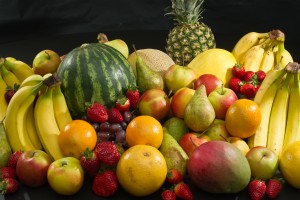19
Apr
Avoiding Pesticide Residues Not Only Reason to Eat Organic Food
(Beyond Pesticides, April 19, 2016) Last week the Environmental Working Group (EWG) released its annual Shoppers Guide to Pesticides in Produce, highlighting the critical importance of eating organic food to avoid pesticide residues that endanger human health. Beyond Pesticides’ Eating with a Conscience database complements EWG’s report by identifying the many additional reasons it is essential to choose organic for a healthy future. Although information on residues in conventional produce listed in the “Dirty Dozen” is helpful in alerting consumers and encouraging organic, it only tells part of the story. It turns out that even those food commodities in EWG’s “Clean Fifteen” may be grown with hazardous pesticides that get into waterways and groundwater, contaminate nearby communities, poison farmworkers, and kill pollinators and wildlife, while not all showing up at detectable levels on our food.
 For its report, EWG analyzed over 35,000 samples of pesticide residue collected by the U.S. Department of Agriculture. After 5 years at the top of the list, apples dropped to number two, replaced by strawberries. The organization reasons that a recent EU ban on the chemical diphenylamine, a fungicide linked to reproductive effects, kidney/liver damage, as well as groundwater contamination and toxicity to aquatic organisms, is behind the switch, as many conventional apples from Europe are exported to U.S. consumers. Roughly 98% of conventional strawberries tested positive for some amount of pesticide residue.
For its report, EWG analyzed over 35,000 samples of pesticide residue collected by the U.S. Department of Agriculture. After 5 years at the top of the list, apples dropped to number two, replaced by strawberries. The organization reasons that a recent EU ban on the chemical diphenylamine, a fungicide linked to reproductive effects, kidney/liver damage, as well as groundwater contamination and toxicity to aquatic organisms, is behind the switch, as many conventional apples from Europe are exported to U.S. consumers. Roughly 98% of conventional strawberries tested positive for some amount of pesticide residue.
“It’s important to remember that conventional agriculture relies heavily on insecticides,” said EWG Senior Analyst Sonya Lunder to TIME. . . “There’s some systematic differences between crops, with some having many pesticides and others being consistently clean.”
Although residues may not show up on finished conventional products, Beyond Pesticides does not believe that the absence of harmful pesticides is reason enough to buy conventional produce and support chemical-intensive farming practices.
For instance, the report finds avocados to be the lowest risk to consumers, topping the “Clean Fifteen” list. However, while avocado grown with toxic chemicals show low pesticide residues on the finished commodity, there are 32 pesticides with established tolerance for avocado, 14 are acutely toxic creating a hazardous environment for farmworkers, 28 are linked to chronic health problems (such as cancer), 7 contaminate streams or groundwater, and 29 are poisonous to wildlife. California, one of the only states to systematically report pesticide poisoning incidents, has reported at least 20 incidents of farmworker poisonings as a result of growing this crop. Further, these poisoning incidents only represent the tip of the iceberg because it only reflects reported incidents in one state, and not other countries where avocados are grown. It is widely recognized that pesticide incidents are underreported and often misdiagnosed. Many of the allowed pesticides on avocado are dangerous to pollinators on which the crop is dependent. In addition to habitat loss due to the expansion of agricultural and urban areas, the database shows that there are also 10 pesticides used on avocado that are considered toxic to honey bees and other insect pollinators.
As Beyond Pesticides’ Eating with a Conscience guide shows, consumers interested in sustainability should consider all the externalities, both upstream and downstream, associated with the production of chemical-intensive fruits and vegetables. To protect farmworkers, farming communities, water supplies, pollinators, and other wildlife, choosing organic whenever possible on all produce is the right choice. For more information on how organic agriculture accomplishes the goal of safe, healthy and nutritious food without sacrificing sustainability, see Beyond Pesticides organic program page.
All unattributed positions and opinions in this piece are those of Beyond Pesticides.
Source: EWG, Time Magazine










